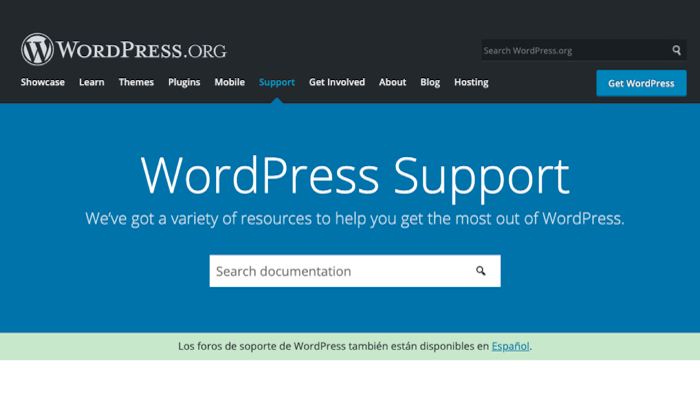
Disclosure: This content is reader-supported, which means if you click on some of our links that we may earn a commission.
The self-hosted WordPress.org wins for giving users a free tool for creating and growing a website just the way they want. There’s a bit of a learning curve, but you can’t put a price on its flexibility that allows you to design, optimize, and monetize your site to your liking. With WordPress.com, you sacrifice the same flexibility in exchange for a free website that takes care of itself. While it takes the guesswork out of website building, WordPress.com has limitations that appeal more to beginners with limited technical knowledge.
WordPress.com or WordPress.org: Which is Better?
WordPress.com is a free platform perfect for beginners who want to play around with a basic website. Its simplicity is second to none, so you can focus more on creating great content without worrying about technical stuff. Create an account today and have your free website ready in minutes.
WordPress.org is best for bloggers and businesses who want to take full control of their websites. You’re free to integrate it with custom themes, plug-ins, and tools, so your website looks, functions, and makes money exactly the way you want it. Download WordPress now and build a website on your terms.
A Review of The Best Website Builders
If you’re looking for a website builder, this in-depth review of my picks should point you in the right direction.
A website builder should help you create a website in minutes without touching any codes. I’ve built countless websites over the years, so I know firsthand what essential features to look for.
Spoiler alert: WordPress is one of the best, but you may find other alternatives that might better meet your requirements.
WordPress.com Wins
Easy to use: WordPress.com is a free managed hosting platform, so starting your website is as easy as creating an account. The team behind WordPress.com takes care of everything so that you won’t have to download any software, pay for a hosting plan, or manage a server. This hands-off style of website creation is ideal for those who want to focus more on their content and launch as many free websites as they want.
100% free for basic users: It’s free to start a website with WordPress.com. Paid plans are also available if you want to remove ads, have a custom domain (such as neilpatel.com) instead of the default subdomain (neilpatel.wordpress.com), and get a larger storage space. The cost of upgrading to paid plans can range from $48 per year for Personal to $540 per year for an Ecommerce plan.
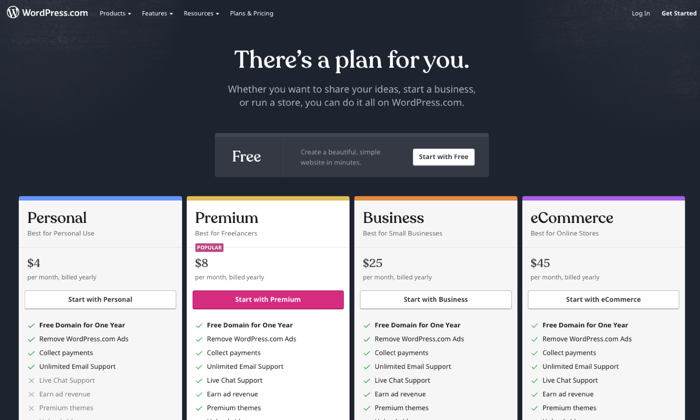
Hands-off maintenance: Having a WordPress.com website is like renting an apartment minus the rental fee. You get to enjoy the room while the landlord takes care of the maintenance. You don’t o need to worry about backups, updates, and other daunting technical stuff—all of that is handled by WordPress.com’s developers and support engineers.
Multiple customer support channels: Support forums are available to answer any technical questions, whether you’re using a free plan or a premium one. Depending on the paid plan you’re subscribed to, you can also access more personalized, round-the-clock support via live chat or email.
Basic customization options: Even if it’s free, WordPress.com still gives you enough elbow room to personalize your website to your liking. There are hundreds of free themes to choose from, so you can pick something that reflects your style and personality. Free WordPress.com websites also come with built-in features like social sharing buttons, polls, comments, image galleries, SEO, and contact forms, so you don’t need to install any third-party plugins.
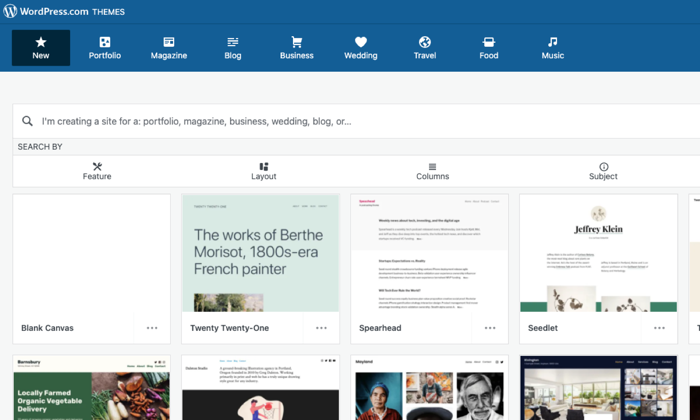
Built-in security features: WordPress.com is a closed ecosystem that is already secured by default. You won’t have to install security features or monitor your website 24/7 for possible malware attacks. Everything is taken care of so you can focus your attention where it’s needed more–creating content.
Painless migration option: Should you decide it’s time to let your website grow into a self-hosted platform, WordPress.com won’t stop you from doing so. Free WordPress.com has a built-in export tool that will pack your entire website into a single downloadable file. You can choose to do the transfer yourself for free or let WordPress.com hold your hand for a small fee. Completing the transfer is as easy as clicking the import tool button in your new self-hosted WordPress dashboard to have your files moved into their new home.
WordPress.com Losses
Unreliable traffic monitoring tool: All users can view a Stats page to see how much traffic their websites get at any given time and where their visitors come from. However, it comes with many limitations, like new visitors not reflecting on the total view count until two hours later. If the visitor views the homepage while reading a post, the view will be counted towards the total views but not towards the individual post. Google Analytics presents more precise data, but you can’t integrate it with WordPress.com unless you’re on Premium or higher plans.
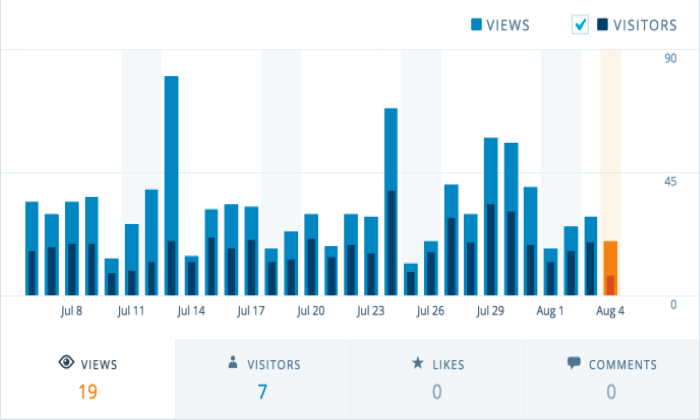
Limited ability to monetize: The free WordPress.com is not designed nor allowed to make you money. You can try your luck with WordAds, WordPress.com’s own advertising network, but you need a custom domain and thousands of traffic per month to be qualified. And even if you get accepted, you’ll only be sharing your revenue with WordPress.com. Google Adsense and ecommerce functionality are only available if you upgrade to Business or higher plans.
Not good for branding: WordPress.com handles everything for free at the expense of flexibility. Although the free themes and built-in features are enough if you only blog for fun, they leave a lot to be desired for most users. Furthermore, the WordPress.com default subdomain and ads won’t help you establish a solid brand in the long term. You have the option to customize your website with third-party themes and plug-ins, but this is a luxury only Business plan users can enjoy.
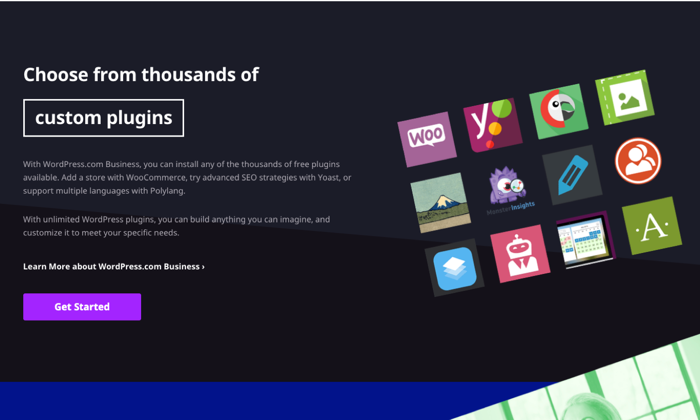
Restricted ownership: Creating a free website with WordPress.com means you don’t have a say in the majority of things concerning your website. Their platform, their rules. First, your website address will use a generic subdomain (i.e., yoursite.wordpress.com) instead of a custom domain name that looks more professional. You also don’t have control over the number and types of ads your readers will see unless you decide to upgrade your plan. Since your ownership is restricted, WordPress.com can delete your website if they discover it violates their terms and conditions.
Lackluster SEO: WordPress.com has built-in SEO features, but they’re barely enough to ensure a good user experience and maximum search visibility. Free accounts only have access to a limited number of free themes, so there’s no way to upload a custom theme that offers better site navigation. You also can’t install popular SEO plug-ins like Yoast SEO or All-in-One SEO, so it’s impossible to add unique titles and meta descriptions to your articles unless you upgrade to a premium plan. Lastly, free plan users can’t use a redirection plug-in, so pages that should have been redirected to another page will just stay and clutter the website.
WordPress.org Wins
A wealth of DIY troubleshooting resources: WordPress.org is open-source software, so there’s an abundance of volunteers and experts who are willing to extend a helping hand. Should you need to fix a technical issue affecting WordPress, assistance is a few searches away through the WordPress.org support forums.

Freel traffic reporting and tracking: Get real-time traffic reports through Google Analytics, a free tool you can install in WordPress by pasting a few codes into your website back end or activating a plug-in that can do the same without all the hassle. Regardless of your hosting plan, you can use Google Analytics to get valuable, granular insights about your visitors and then use the data to guide you in making important business decisions.
Unlimited money-making potential: If you have a self-hosted website with WordPress.org software, the sky’s the limit when it comes to earning money. You can run ads on your own without sharing the revenue with anyone. You’re also free to explore other monetization methods like affiliate marketing, publishing sponsored content, or building membership sites that sell premium content or courses. What’s more, if you want to build an online store, a WordPress.org website has the most robust ecommerce functionality.
Impressive flexibility: Thanks to WordPress.org, you can have a self-hosted website and the freedom to do anything you want with it. Do you want to change your theme? You can install one of many custom themes online or build one from scratch with PHP and CSS. There’s also an endless list of third-party plug-ins you can install to improve your website’s look and functionality. From SEO tools to ecommerce extensions, there’s no restriction on how potent you want your website to become.
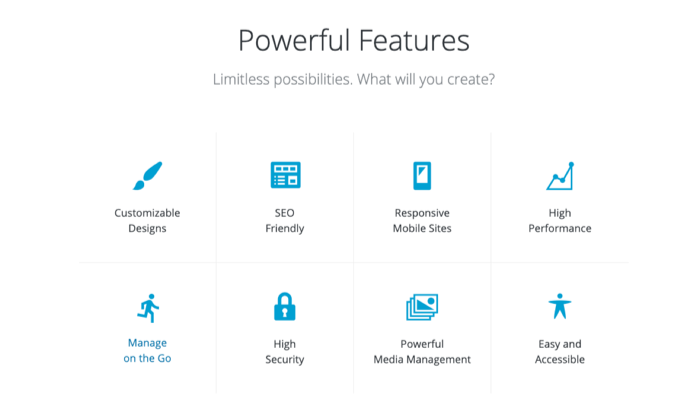
Uncomplicated security setup: Keeping your site secure is as easy as installing a few plug-ins and letting your hosting provider do the rest. It’s not totally hands-off, but ensuring your website is secure doesn’t require a steep learning curve either. After all, you can easily reach out to your web host or one of WordPress.org support forums if you’re struggling to implement security measures on your own.
Full ownership and control: Building a website with WordPress.org means you have full ownership of your web property. There is no higher power breathing down your neck that can banish your website the first chance it gets. As long as you’re not doing any shenanigans, you can rest well at night thinking you have full control of your website’s destiny.
Freedom to leverage SEO: With full control also comes the power to directly influence how your content ranks on search engines. A self-hosted website gives you all the freedom to tinker with different SEO tools that can optimize your images, titles, meta description, site maps, and internal links. Google Analytics is also easy to install to quantify how effective your SEO strategies are and identify areas of improvement. If the user experience is a priority, you can also install and tweak your preferred custom theme to help improve how your readers navigate your website.
WordPress.org Losses
Lacks simplicity for non-tech savvy users: WordPress.org is an open-source content management system, not a full-blown website. To launch your website, you first need to purchase a domain name and pay for a hosting plan. After downloading the WordPress.org software, have it installed in your web host. Some hosting providers have also made this step easier by offering “one-click” WordPress installation. Although you don’t need to touch any codes, beginners may initially find the whole process intimidating.
Building and keeping a website are not totally free: WordPress.org itself is free. However, it can’t stand on its own unless you have a domain name and a web host. A domain name is your website address (e.g., neilpatel.com) and will cost a minimum of $10 per year for a standard “.com” domain. On the other hand, a web host is where you’ll store your website files—including WordPress.org—and should cost you a minimum of $3 to $10 per month. And don’t forget the cost of premium themes and plug-ins that will further hurt your pocket unless you already have a site that pays for itself.
Routine maintenance: Managing a self-hosted site is like having your own house. You’re free to do anything with it, but you have to fix it yourself should things break. As a website owner, you’re responsible for updating the WordPress software and all the plug-ins you have installed. Even if web hosts offer backups, these are rarely comprehensive and guaranteed, so you also need to back up the files yourself.
Comparing The Top Website Builders
Whether you’re a clueless beginner or a tech-savvy webpreneur, my in-depth review of the best website builders will help you choose the platform that will best meet your goals.
- Wix — Best for general use
- Weebly — Best for beginners
- Shopify — Best for ecommerce
- WordPress — Best for content management
Wix is the “jack of all trades” where you can build any website that doesn’t need bells and whistles. If you’re looking for fewer features and a more beginner-friendly platform, Weebly will not disappoint with its drag-and-drop interface. Are you building an online store? Look no further than Shopify that is made specifically for this purpose.
However, if you want to put your content front and center, nothing compares to the functionality of WordPress. As a content management system, it powers 39% of the Internet’s top 10 million websites. And for a compelling reason: It has everything you need to scale, optimize, and get the most out of your content.
The post WordPress.com Vs. WordPress.org appeared first on Neil Patel.
via https://AiUpNow.com February 12, 2021 at 12:02PM by Neil Patel, Khareem Sudlow,
